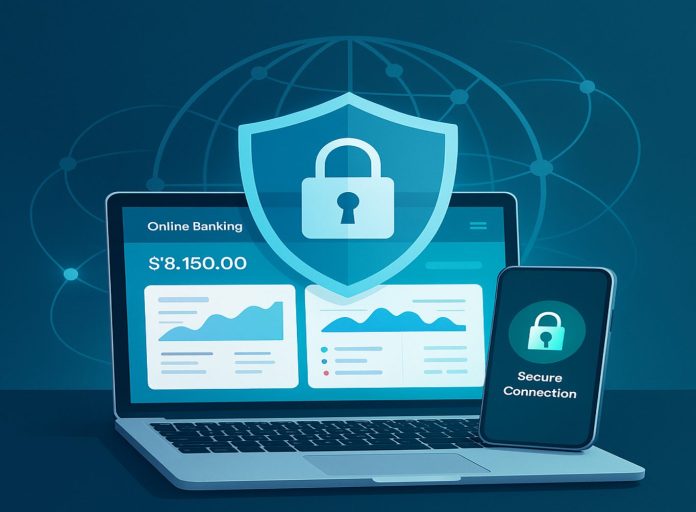It’s no longer enough to have a strong password and hope for the best. In 2025, money moves faster, attackers are smarter, and our financial lives are deeply entwined with the internet. Reports show that the average global data breach still costs more than four million dollars — a figure that hasn’t budged much in years despite all the security spending. At the same time, billions of stolen logins are floating around on criminal forums. If you bank, invest or pay bills online — in other words, if you do anything with money — you’re part of this picture.
The New Threat Landscape
Banks and insurers have always attracted cyber-criminals, but the methods are shifting. Social-engineering scams, phoney websites, and old-fashioned credential theft are still the front door, yet criminals are also hammering on the infrastructure behind the scenes. Security teams say vulnerabilities in remote-access systems and outdated VPN hardware have become a favourite target, because compromising one gateway can open up an entire network. For individuals, that translates into a higher chance your personal data could be caught up in someone else’s breach.
During just the first half of this year, over a hundred million Americans had some form of information exposed in cyberattacks. Many of the notices were vague, leaving customers unsure of what was taken. Meanwhile, researchers tracking leaked credentials have watched the numbers spike dramatically — an endless supply of usernames and passwords waiting to be tried on banking, brokerage and payment sites.
Everyday Weak Spots
Think about where you do your online banking or trading. Sitting in an airport lounge on “free Wi-Fi”? Logging in quickly at a café? Those are classic moments of exposure. Public Wi-Fi, even when it’s password-protected, is effectively a shared network where your traffic can be watched or intercepted. Add in the steady drumbeat of phishing emails and fake login pages, and it’s easy to see how people get caught out. And for finance professionals working remotely, using a personal laptop or phone that isn’t locked down can undo a lot of corporate security.
Building Better Habits
There’s good news: a handful of simple changes cuts your risk dramatically. Use unique, long passwords or, better yet, passkeys that can’t be phished. Turn on multi-factor authentication wherever your money is involved; a hardware key or built-in device prompt is far stronger than a text message. Keep your software up to date so known flaws are patched before someone exploits them. And stay suspicious of “urgent” emails asking you to log in or reset something — a few seconds of caution beats hours of damage control.
Protecting the network path is the habit most people skip. If you’re checking a balance or making a transfer on public Wi-Fi, a reputable VPN creates an encrypted tunnel that keeps prying eyes from seeing your session. It won’t stop phishing or malware, but it does stop casual snooping and data capture between you and your bank.
Choosing a VPN Wisely
If you’re going to rely on a VPN for financial privacy, don’t just grab the first one you find. Look for modern encryption, a clear no-logs policy, and built-in safeguards like a “kill switch” so traffic doesn’t leak if the connection drops. Speed matters too — nobody wants a frozen screen in the middle of a trade. A well-chosen VPN, combined with the other habits above, becomes one more solid layer in your personal security stack.
For Finance Teams
On the organisational side, the stakes are higher but the principles are the same. Keep remote-access systems patched, segment access so one compromised device can’t reach everything, and limit unmanaged personal devices on financial networks. If you must allow bring-your-own-device, enforce encryption and remote-wipe policies. Monitor public repositories for leaked credentials and react quickly — waiting months leaves a window wide open.
When Something Goes Wrong
Even with all the precautions in the world, incidents happen. If you suspect your account has been compromised, call your bank or broker right away and follow their fraud procedures. Change your logins, revoke old sessions, enable stronger multi-factor authentication, and consider a credit freeze if sensitive data was exposed. Speed is your friend in limiting the damage.
Bottom Line
Cybercrime against financial accounts isn’t going away, but the defences are in your hands. Strong credentials, multi-factor authentication, up-to-date software, a sceptical eye toward phishing, and the smart use of a VPN together go a long way toward keeping your money safe online. In 2025, taking those steps is less about paranoia and more about basic hygiene — the digital equivalent of locking your front door before you go out.



 Bitcoin
Bitcoin  Ethereum
Ethereum  Tether
Tether  XRP
XRP  USDC
USDC  TRON
TRON  Lido Staked Ether
Lido Staked Ether  Cardano
Cardano  Avalanche
Avalanche  Toncoin
Toncoin  Wrapped SOL
Wrapped SOL